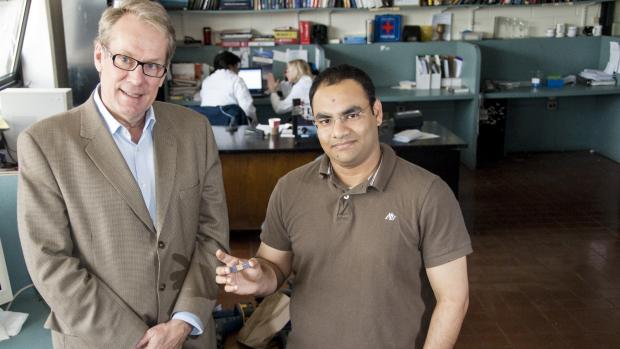NYU-Poly Professor among First Winners of BioAccelerate NYC Prize
Project May Move Diagnostic Medicine from the Lab to the Palm of a Hand

The future of diagnostic medicine may lie in an inexpensive credit card-sized device that requires no advanced training to operate, uses minimal power and provides high-accuracy detection of infectious diseases from a single patient sample in less than 30 minutes.
Dr. Kalle Levon, professor of chemical and biological science at Polytechnic Institute of New York University (NYU-Poly), is one critical step closer to turning this concept into reality as one of six winners of the first BioAccelerate NYC Prize, a $1.5 million grant created to fuel the growth of life science and biotech businesses in New York City.
Each BioAccelerate NYC winner will receive a $250,000 grant to conduct late-stage, proof-of-concept research on products to improve health and wellness. BioAccelerate NYC is a project of the Partnership for New York City and the New York City Economic Development Corporation (NYCEDC).
Dr. Levon’s proposal — the sole winner to address a diagnostic issue — tackles the inefficiencies of infectious disease diagnostics including high cost, lengthy result times, bulky equipment and the need for large sample sizes and highly trained personnel.
Uniting experts in polymer chemistry, electrical engineering and medical research, Dr. Levon has conceptualized a handheld, point-of-care device to detect infectious diseases using a patented floating gate field effect transistor (FGFET) biosensor.
This cost-effective biosensor utilizes readily available MOS transistors coated with a conductive polymer. When in contact with a small sample of body fluid, the polymer detects biological and chemical binding reactions with a high degree of sensitivity, translating these signals into electrical signals. A light on the device would indicate a positive or negative test result. Due to small size, easy interpretation of results and low sample volume required, a technician with basic training could utilize the device in any clinical setting, no matter how rudimentary, anywhere in the world.
This field of study, known as organic electronics, has been applied to diagnostic techniques in research and academia for a decade, but Dr. Levon’s team is the first to conceive a commercial application utilizing this technology.
“Our goal at NYU-Poly is to transform research outcomes into applications that solve 21st century problems,” said NYU-Poly Provost Dr. Dianne Rekow. “Dr. Levon’s work is an ideal example of our core philosophy, i2e — invention, innovation and entrepreneurship — come to life. We salute the city for its support of a project that could benefit healthcare systems worldwide.”
The BioAccelerate grant will facilitate the development of a complete prototype, created in partnership with The Brooklyn Hospital. The pilot will focus on chlamydia and gonorrhea detection, but the technique could be applied to any infectious disease, including H1N1 or HIV.
Previous lab tests proved the FGFET biosensor’s efficacy in detecting a single biomarker, but Dr. Levon ‘s vision includes the creation of a scalable, multiplex array of sensors capable of testing for several agents simultaneously, as well as applications for cancer diagnostics.
“Our research team appreciates the valuable resources provided by The New York City Investment Fund, the economic development arm of the Partnership for New York City,” said Dr. Levon. “The BioAccelerate NYC Prize certainly helps us traverse the ‘Valley of Death’ in which innovation often founders for lack of investment, but equally important to our project was the valuable business mentoring. David E. Shaw, managing partner of Blackpoint Group and founder of IDEXX Diagnostics, was essential to our success.”
About Polytechnic Institute of New York University
Polytechnic Institute of New York University (formerly Polytechnic University), an affiliate of New York University, is one of New York City’s most comprehensive schools of engineering, applied sciences, technology, and research, and is rooted in a 156-year tradition of invention, innovation, and entrepreneurship: i2e.
The institution, founded in 1854, is one of the nation’s oldest private engineering schools. In addition to its main campus at MetroTech Center in downtown Brooklyn, it offers programs at sites throughout the region and around the globe. NYU-Poly has centers in Long Island, Manhattan and Westchester County; globally, it has programs in Israel, China and will be an integral part of NYU's campus in Abu Dhabi opening in autumn 2010.




